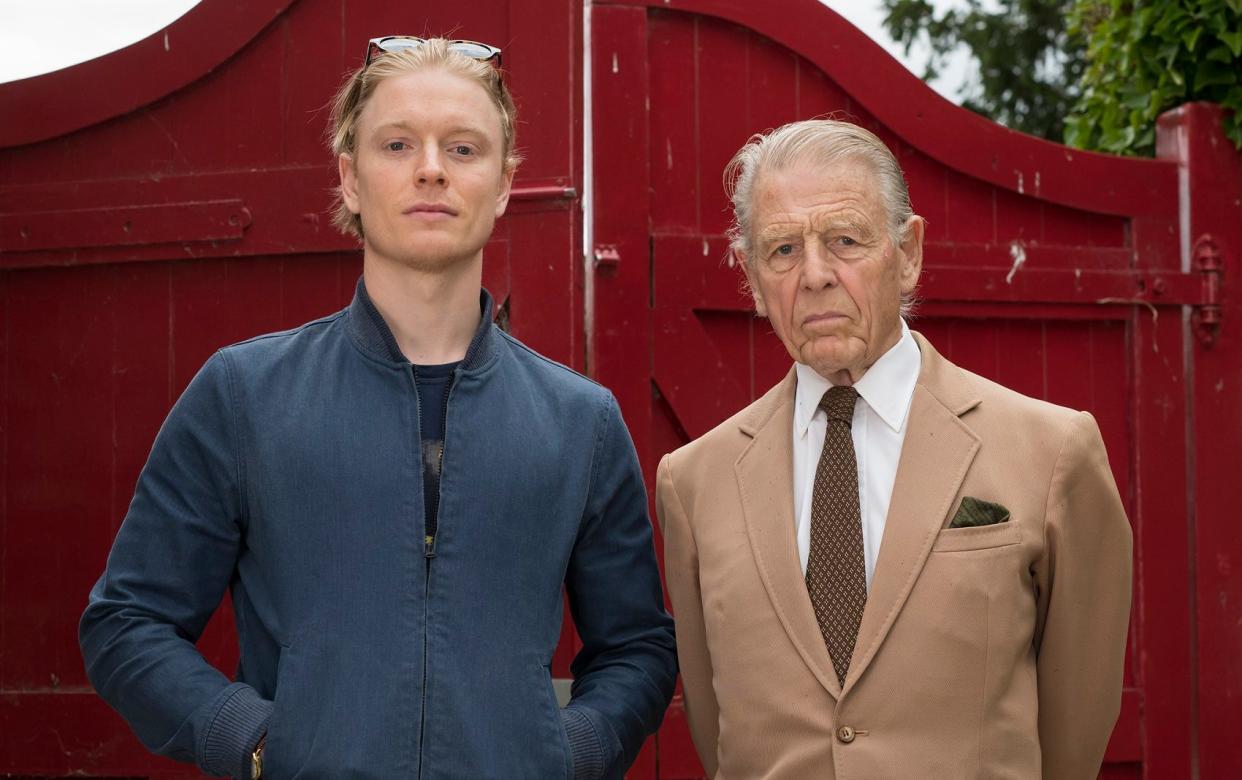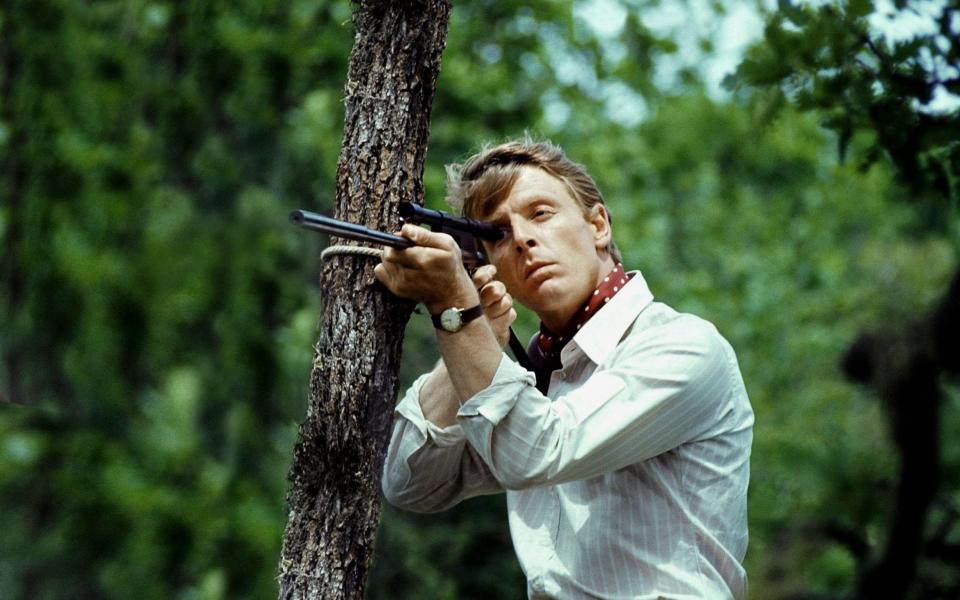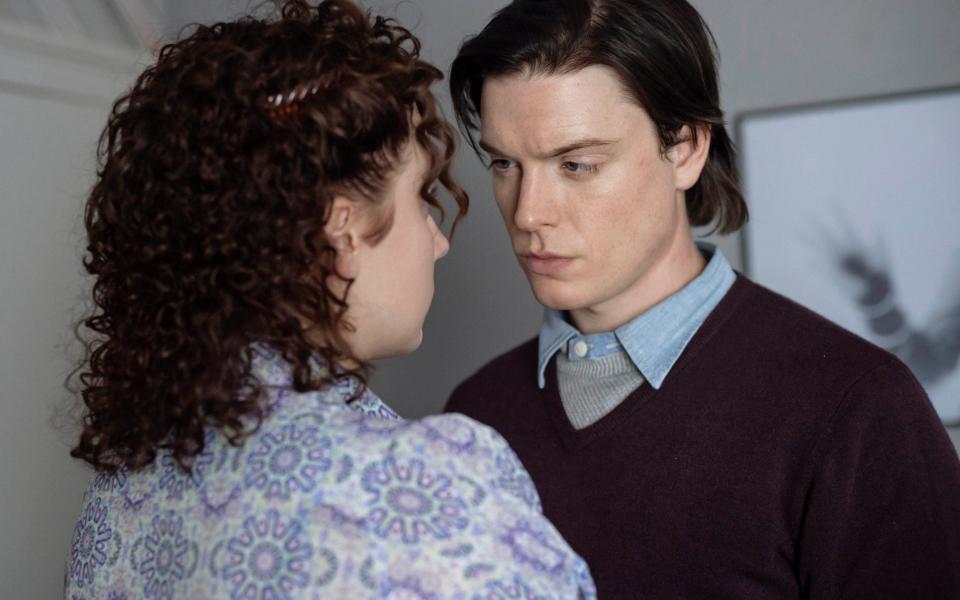‘Cancelling people is inhuman and stupid’: Edward and Freddie Fox on their disruptive relatives

“I know where you’re going with this,” says Freddie Fox. “Can I just pre-empt it; this is not a topic we’re going to talk about... It’s too fraught a subject.”
“What topic?” says his father, Edward Fox.
Freddie: “He wants to talk about Laurence.”
Edward: “Oh... Lozza.”
It’s a baking summer’s day, and I’m sitting in a Dorset pub garden with two members of the illustrious Fox acting dynasty. Edward Charles Morice Fox – brother of James and star of The Day of the Jackal and Edward & Mrs Simpson – is dressed, with panache, in suit and tie. Frederick Samson Robert Morice Fox – brother of Emilia and star of White House Farm, Slow Horses and The Riot Club – is in faded jeans and espadrilles. He’s clearly solicitous of his father. There’s a more than 50-year age gap: Edward is 85, still treading the boards, and once said of himself: “My ability to be indiscreet has absolutely no equal.”
Freddie, at 33, is the late-life baby of the family – “a bit spoilt”, he once told me – and acutely aware of the circus surrounding his cousin, the actor turned political activist, Laurence Fox. I’ve begun to ask if the family would like him to cease and desist his war on woke and diversity but haven’t quite got the question out when Freddie interjects. “I’m going to, I think, tactfully pass on that one.” He turns to his father. “Please don’t feel the need to add...”
Edward: “No, no, no, no, I won’t feel constrained at all. I don’t really know the boy. I haven’t seen him… I mean, I wish him well.”
Freddie: “Dad, stop, stop. Just stop. This is too live a topic. Can we just not talk about it?”
There’s a pleasing symmetry to this gentle contretemps between the two. In 2018, they appeared on stage together playing sparring father and son aristocrats in a sprightly production of Oscar Wilde’s An Ideal Husband. “We’d have wonderful lunches together before the evening show,” Freddie says. “We just laughed and laughed all summer long.”
We’ll return to Laurence. But not yet. I’ve come to talk about a different Fox entirely. There are plenty to choose from: actresses, agents, dramatists and film producers among them. The middle name that both men share – Morice – belongs to an ancestor who played football for England in the first ever international match, against Scotland, in 1872. Yet it is Freddie alone who bears the name of another distant forebear: Samson Fox, Edward’s great-grandfather. In 1846, aged eight, and with no formal education, Samson was working in a Bradford mill, yet he rose to become a remarkable industrialist and inventor.

He’s part of the family’s oral history, Edward tells me, “His father was a weaver, so they would have been craftsmen peasants. But by the age of 12, he’d said to his parents, ‘I’ll tramp until I find work in iron and steel.’ ” By 15, he was an apprentice in a Leeds engineering works; at 22, a mechanic; at 32, an employer of men and boys himself. He would go on to help shape the Industrial Revolution with a boiler innovation that led to faster ships – technology that was adopted by the Royal Navy – and a steel railway chassis that was successfully exported to the railroads of America. Samson became extremely rich. He is remembered as a philanthropic benefactor of the Royal College of Music, and mayor of the thriving spa town of Harrogate.
He’s now also the subject of a play, The Man Who Captured Sunlight, which the family is producing, although not performing in, next month at Harrogate’s Royal Hall – a theatre that the industrialist was instrumental in building.
Samson, later in life, found himself embroiled in a financial scandal after he became obsessed with the idea that “water gas” – a mixture of hydrogen and carbon monoxide made by passing steam over hot coke – was the future of energy. He began experimenting with it in his laboratory, believing it could replace coal gas in lighting people’s homes. It burnt much brighter. As mayor, Samson demonstrated it as street lighting in Harrogate, and attracted investors. But there were safety concerns, and resistance from the existing coal-gas cartel, leading to the collapse of the scheme.
Samson was accused in the press of swindling people out of their money. It culminated in a 19th-century libel trial involving newspaper editor Jerome K Jerome, the author of Three Men in a Boat, that would have been a sensation now. “The very famous barrister who prosecuted Wilde used every dirty trick in the book to try to defame Samson,” Freddie says. The inventor ultimately cleared his name, but the damage had been done.
Freddie points out that Samson’s revolutionary experiments find an echo today, with clean hydrogen being touted as the fuel of the future, although he notes that Samson’s industrial methods “wouldn’t have passed the green test now”.
“I think he was trying to do things that would prosper humanity,” Edward adds. “I’m sure that was the driving force, because he will have seen life at the poorest.”
Samson has been described as a Victorian Elon Musk – Freddie compares the two men’s belief in “big ideas”. As for Musk’s plan to build on Mars: “I think it would be great if we could focus on saving this planet before we worry about putting us on another one.”
Of course, the play arrives at a time when cultural forces seem to be demanding that Britain be ashamed of its past, and ambivalent about its achievements. “I think we’re losing touch with our culture,” Edward says. “And I think people regret losing touch with it. All humans need to feel a connection with their past, how it relates to them. The idea of forgetting the past – or worse, dismissing or deriding the past as being unnecessary – is just simply stupid. And it should be discouraged, [especially] in schools. Goodness me, the country should be very, very proud of its forebears, particularly those of the 20th century; we only live in freedom today because of those forebears.”

Edward was born in 1937 and has vivid early memories of the Second World War. He thinks his son would be surprised by how it felt to be alive in those times. Edward’s own father was the famous theatrical agent (and philanderer) Robin Fox, who looked after Julie Christie, Marianne Faithfull, and the young Maggie Smith, but he didn’t encourage any of his sons to go into acting. (Edward at one time was working towards becoming a manager at Marks & Spencer.)
Yet the stage was calling, and Edward managed to get a job at Chesterfield rep, then in Dundee, Glasgow and Canterbury. His younger brother James had already made a splash on the big screen by 1963, and Edward would not catch up until he won a part in The Go-Between in 1971, but the two spent the Swinging Sixties sharing a flat in Marylebone, knocking about with the fashion photographer Terence Donovan, after Edward’s first marriage (to the actress Tracy Reed) had ended in 1961.
By the time he won the part of the assassin hired to kill French president Charles de Gaulle in The Day of the Jackal in 1973, Edward was dating the actress Joanna David. On Desert Island Discs in 1979, he chose a Fats Waller tune My Very Good Friend the Milkman, and laughed at its refrain – “he suggests that you should marry me” – as “exactly the sort of thing that is always being said about Joanna’s and my relationship; we’re always being advised to marry”. They finally did, in 2004.
Freddie was born in 1989, 15 years after his sister Emilia (now known as the star of Silent Witness), and almost three decades after their half-sister Lucy, who became Viscountess Gormanston in 1997. He’s a quicksilver screen presence, who can flit from playing the aloof banker’s son Tony Kroesig in the recent Nancy Mitford adaptation, The Pursuit of Love, to real-life murderer Jeremy Bamber in ITV’s White House Farm to Mark Thatcher in The Crown. He regularly appears on stage, recently as Hamlet, a role his father has played three times. Edward reckons he has seen his son in everything he’s done. “Not the telly,” clarifies Freddie. “I think the last time you truly watched television was probably around 1972, something like that?”
“I’m not an expert,” Edward replies, drily.
Again, there was no parental expectation that Freddie would follow the family profession. “I could have been a transgender plumber if I’d wanted to be,” he told me last time we spoke.
The younger Fox is clearly someone with a progressive mindset; I wonder what he makes of “cancel culture”? It is at this point that he chooses to revisit the subject of the cousin he cares for “enormously”. “I disagree with what Laurence says. I disagree with it firmly, as is my right, but, nonetheless, I don’t want to comment on him as a person; he’s part of our family. But I also think that cancel culture, which is something that has, in inverted commas, happened to him, is an unhealthy and unintelligent facet of our society at this moment. We need to allow broad, intelligent conversations to be had without fear that your entire career and lifestyle and your children’s education or your parents’ health might be on the line, for an opinion that in print can be extrapolated into something that perhaps goes beyond its intention.”

One can see the emotion running through Freddie as he speaks, and it is clear that he is in many ways talking directly about his cousin. A fine actor who starred in the Inspector Morse spin-off Lewis for nearly a decade, Laurence’s whole life has taken a different course since he got into a row with an audience member on Question Time in 2020. That was about whether British attitudes to Meghan Markle were racist, an argument that began with Fox insisting “we’re the most tolerant, lovely country in Europe”, but has since hardened into views such as “the only racism I can see in this country that is systemic is against white people”.
Freddie continues: “On the one hand, yes, I’m of liberal mind, and I disagree with a lot of the harder line stuff, I think it’s repugnant. But on the other hand, cancelling people’s points of view and cancelling their livelihoods and their lives – and the effect that that has on their families – is also inhuman. It’s so stupid. We’ve got to embrace the grey area, the conversation of the middle ground, and try to encourage people to be more intelligent with what they put out into the world.”
I’m struck by just how articulately father and son express themselves. Perhaps it comes with the territory. Edward continues to work – he’s been rehearsing for a production of Enid Bagnold’s The Chalk Garden, being put on by Bill Kenwright in Windsor next month – and why wouldn’t he?
“If you think you can do it, and you’ve got the voice... do it,” he says. “It’s all about confidence.” He recalls his old friend Rex Harrison “when he was in his late years, he was very unsure – and Rex didn’t often show vulnerability.
“That’s the secret,” he concludes. “If you’ve lost your confidence, don’t go on stage. Because it’s a lions’ pit.”
The Man Who Captured Sunlight is at Royal Hall, Harrogate (harrogatetheatre.co.uk) on Sept 23

 Yahoo News
Yahoo News 
